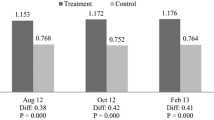Abstract
Most questionnaires to obtain reports of happiness are primitive with the results obtained of low (interpersonal) comparability. This paper argues that happiness is intrinsically cardinally measurable and comparable though with many difficulties. Moreover, a sophisticated questionnaire was developed and used to obtain more accurate and interpersonally comparable reports of happiness based on the concept of just perceivable increments of pleasure/pain. Comparisons with the traditional questionnaire are also made (by the respondents) to show the superiority of the sophisticated questionnaire.
Similar content being viewed by others
References
Allais, M. and Hagen, O.: 1979, Expected Utility Hypothesis and the Allais Paradox (Reidel, Dordrecht, Holland).
Luce,R. D.,Bush, R. R. and Galanter, E. (Eds.): 1963, Handbook of Mathematical Psychology 1 (Wiley, New York).
Merkel, J.: 1888–9, ‘Die Abhängigkeit zwischen Reiz und Empfindung’, Philosophische Studies 4, pp. 541–594; 5, pp. 245–291 and 499–557.
Ng, Y-K.: 1975, ‘Bentham or Bergson? Finite sensibility, utility functions and social welfare functions’, Review of Economic Studies 52, pp. 545–569.
Ng, Y-K.: 1984, ‘Expected subjective utility: Is the Neumann-Morgenstern utility the same as the neoclassical's?’, Social Choice and Welfare, pp. 177–186.
Ng, Y-K.: 1985, ‘Some fundamental issues in social improvements’, Issues in Contemporary Microeconomics and Welfare (Macmillan, London), pp. 435–469.
Ng, Y-K.: 1988, ‘Economic efficiency versus egalitarian rights’, Kyklos 41, pp. 215–237.
Ng, Y.-K.: 1990, ‘Welfarism and utilitarianism: A rehabilitation’, Utilitas, November 1990, 2(2), pp. 171–193.
Seidl, C.: 1988, ‘Experimental utility functions of income and their associated tax schedules’, Diskussionsbeiträge aus dem Institut für Finanzwissenschaft der Universität Kiel, March.
Sidgwick,H.: 1981, The Method of Ethics, 7th edition (Hackett, Indianapolis).
Slovic,P. and Lichtenstein, S.: 1983, ‘Preference reversals: A broader perspective’, American Economic Review, September, 73(4), pp. 596–605.
Stevens, S. S.: 1957, ‘On the psychophysical law’, Psychological Review 64, pp. 153–181.
Tversky, A., Slovic, P. and Kahneman, D.: 1990, ‘The causes of preference reversal’, American Economic Review, March, 80(1), pp. 204–217.
Veenhoven, R.: 1984, Conditions of Happiness (Reidel, Dordrecht, Holland).
Wegener, B. (Ed.): 1982, Social Attitudes and Psychophysical Measurement (Erlbaum, Hillsdale, N.J.).
Author information
Authors and Affiliations
Rights and permissions
About this article
Cite this article
Ng, YK. Happiness surveys: Some comparability issues and an exploratory survey based on just perceivable increments. Soc Indic Res 38, 1–27 (1996). https://doi.org/10.1007/BF00293784
Issue Date:
DOI: https://doi.org/10.1007/BF00293784




